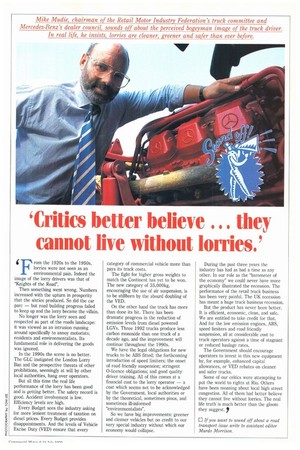'Critics better believe ... they cannot live without lorries.'
Page 37

If you've noticed an error in this article please click here to report it so we can fix it.
lorries were not seen as an
4 rom the 1920s to the 1950s,
environmental pain. Indeed the image of the lorry drivers was that of "Knights of the Road".
Then something went wrong. Numbers increased with the upturn in prosperity that the sixties produced. So did the car parc — but road building progress failed to keep up and the lorry became the villain,
No longer was the lorry seen and respected as part of the roads landscape: it was viewed as an intrusion running around specifically to annoy motorists, residents and environmentalists. Its fundamental role in delivering the goods was ignored.
In the 1990s the scene is no better. The GLC instigated the London Lorry Ban and the prospective threats of other prohibitions, seemingly at will by other local authorities, hang over operators.
But all this time the real life performance of the lorry has been good and is getting better. The safety record is good. Accident involvement is low. Efficiency levels are high.
Every Budget sees the industry asking for more lenient treatment of taxation on diesel prices. Every Budget provides disappointments. And the levels of Vehicle Excise Duty (VED) ensure that every category of commercial vehicle more than pays its track costs.
The fight for higher gross weights to match the Continent has yet to be won. The new category of 35,000kg, encouraging the use of air suspension, is to be stillborn by the absurd doubling of the VED.
On the other hand the truck has more than done its bit. There has been dramatic progress in the reduction of emission levels from diesel powered LGVs. Three 1992 trucks produce less carbon monoxide than one truck of a decade ago, and the improvement will continue throughout the 1990s.
We have the legal obligations for new trucks to be ABS fitted; the forthcoming introduction of speed limiters; the onset of road friendly suspension; stringent 0-licence obligations; and good quality driver training. All of this comes at a financial cost to the lorry operator — a cost which seems not to be acknowledged by the Government, local authorities or by the theoretical, sometimes pious, and sometimes ill-informed "environmentalists".
So we have big improvements: greener and cleaner vehicles but no credit to our very special industry without which our economy would collapse. During the past three years the industry has had as bad a time as any other. In our role as the "barometer of the economy" we could never have more graphically illustrated the recession. The performance of the retail truck business has been very painful. The UK recession has meant a huge truck business recession.
But the product has never been better. It is efficient, economic, clean, and safe. We are entitled to take credit for that. And for the low emission engines, ABS, speed limiters and road friendly suspension, all at considerable cost to truck operators against a time of stagnant or reduced haulage rates.
The Government should encourage operators to invest in this new equipment by, for example, enhanced capital allowances, or VED rebates on cleaner and safer trucks.
Some of our critics were attempting to put the world to rights at Rio. Others have been moaning about local high street congestion. All of them had better believe they cannot live without lorries. The real life truth is much better than the gloom they suggest. y












































































